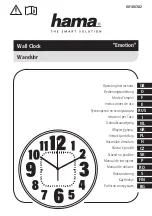
B.9 Power System Time, Frequency and Phase Monitor
131
B.9
Power System Time, Frequency and Phase Monitor
B.9.1
General Description
This section describes the optional Power System Time, Frequency, and Phase Monitor.
B.9.2
Discussion
Provides the clock with the ability to accept either a 50 Hz or 60 Hz, 30 Vrms to 300 Vrms signal input and
measure the instantaneous phase, magnitude and frequency of the fundamental component while rejecting
the effects of harmonics, noise and DC offsets. This option also integrates total time deviation, which is
system time minus GNSS time. Measurement results may be output via the rear-panel RS-232 connector or
displayed on the front panel. To determine phase shift across a transmission line, the measured phase angles
from two units placed at the ends of the line are subtracted and normalized into the range of 0 to 360 (or
±
180) degrees. By subtracting the two measurements of absolute phase, which are measured using the same
(GNSS time) reference, the reference cancels leaving the phase angle between the two units: A-B = (A-R) -
(B-R).
B.9.3
System Reference Connection
To connect the option board to the system reference input perform the following steps:
1. Using the 6 m (20 ft) length of twin axial cable provided, connect the twin-ax connector to the option
connector on the rear panel. Hold the cable connector by its body (not by the rotating locking ring)
and rotate it inside the twin-BNC connector until you feel it begin to mate with the twin-BNC input
of the option assembly. Once the connectors begin to mate, then use the locking ring to secure the
connectors together.
2. Strip the unterminated end of this cable and prepare it as required for termination to your System
Reference signal. Do not connect the shield of the cable at the reference input end.
CAUTION:
The twin-BNC connector, unlike a standard BNC connector, will only mate properly in one
orientation, and any attempt to force the connector into position with the locking ring when it is improperly
oriented (as may be done with standard BNC connectors) will not work and may damage the connector.
NOTE:
The supplied cable is terminated at one end with a twin-BNC connector which mates with the
system reference input of the option board.
B.9.4
Firmware Configuration
Apply power and observe front panel display, when CLOCK STATUS STARTUP is displayed, press the
SETUP key.
Navigate through the series of menu selections, using either the DOWN, UP or SETUP key, until SET
OPTION CONTROL? appears. Press ENTER and navigate to AUX. BOARD OPTION.
Press ENTER, and then press the UP key until option is displayed. Press ENTER. You will be given
additional setup choices for the option; Set System Time Dev?, Set UTC/Local Time, Set 50/60 Hz Input,
and Return to Main Menu. Select the desired choices. When complete (if this is the first time these options
have been activated), turn the clock OFF and back ON again to initialize the Option Boards.
AUX. BOARD OPTION
NONE
AUX. BOARD OPTION
Time & Freq.
Monitor
SET SYSTEM TIME DEV?
+/-XXXXX.XXX Sec
Содержание 1200B
Страница 4: ...iv ...
Страница 135: ...A 3 Physical Dimensions 117 Figure A 2 Suggested Mounting of the GNSS Surge Arrester ...
Страница 143: ...B 7 Four Fiber Optic Outputs 125 Figure B 4 Jumper Locations ...
Страница 145: ...B 8 8 Channel High Drive IRIG B Amplifier 127 Figure B 5 8 High Drive Outputs Jumper Locations ...
Страница 161: ...B 10 Four Additional Outputs and Dry Contacts 25 50 Vdc 143 Figure B 7 Option Connector Signal Locations ...
Страница 212: ...Appendix E Statement of Compliance The following page is a statement of compliance that includes Model 1201B and 1201C ...
















































